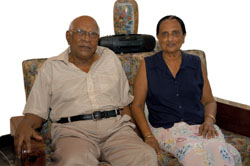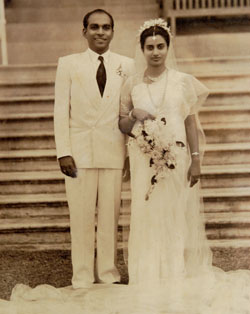|
Darling we aren't too old, though we pass the Jubilee Gold
Forgive and forget
Secrets of a happy marriage :
by Lakmal Welabada
|

Dr. Jayasuriya and Yasoma
Pix: Chinthaka Kumarasinghe
|
"Marriage is a business of give and take. One should cultivate
patience and tolerance on a great scale if he or she wants to have a
happy marriage. People make mistakes. So, better forgive them,"
advocates Dr. Jayasuriya who will celebrate his 54th Wedding Anniversary
this year.
Mahabaduge Hiranya Fernando Jayasuriya was born on June 6 in 1924 at
Dehiwala to M. David Fernando Jayasuriya, a landed proprietor and Agnus
Matilda Gunewardane as the youngest of seven siblings.
"My very first school was Girls' High School, Dehiwala. I attended
pre-school there. Since I was a brat, my sisters who were studying in
the upper grades there always got complaints and even scolded over my
mischievousness. I was a headache to them. They used to grumble at home
saying I was a great trouble maker at school. Luckily to their relief I
was soon sent to S. Thomas, Mount Lavinia," recollects Jayasuriya.
Jayasuriya's maternal grandfather, W. F. Gunewardana who lived in the
famous Wasala Walawwa, Mount Lavinia was a scholar in oriental
languages. He was a government officer who worked as a chief translator
in the courts.
Since this was during the British era, Swabhasha concept was rising
up all over. Though S. Thomas gave an intensive English education,
Sinhala language was not taught with much enthusiasm. "Learning Sinhala
was considered as an informal 'must' among many rich and poor of Sri
Lanka at that time.
Indian independence movement might have also been influenced greatly
into this. However my mother who was watching all of us my four elder
brothers and I studying in English at S. Thomas and St. Josephs got so
anxious.
Being a daughter of a Sinhala scholar she also wanted one of her sons
to carry on her father's work. This made her to enter me to Ananda
College, Colombo. And from grade 6 to London Matriculation I had a great
time at this Buddhist National School," he recalls.
Jayasuriya's Sinhala was too weak to master Sinhala literature. But
he won the challenge. "Ananda College provided us completely a different
atmosphere from S. Thomas.
Although medium of teaching was English, everything else was done
according to the Sinhala culture and customs. I found it really
difficult to fit in to the Sinhala Buddhist nationalism.
 However, it provided us a great opportunity to learn our own roots of
the motherland, giving us an extra prestige that we also hailed from a
great nation. Mr. P. D. de S. Kularatne was the Principal at Ananda at
that time," says Jayasuriya."S. Thomas exposed us to a good English
background while Ananda sought out our lineage as a nation and a great
knowledge in oriental languages. They were two different worlds, and I
was fortunate to get the best of both," he says. However, it provided us a great opportunity to learn our own roots of
the motherland, giving us an extra prestige that we also hailed from a
great nation. Mr. P. D. de S. Kularatne was the Principal at Ananda at
that time," says Jayasuriya."S. Thomas exposed us to a good English
background while Ananda sought out our lineage as a nation and a great
knowledge in oriental languages. They were two different worlds, and I
was fortunate to get the best of both," he says.
"We learnt Pali also in English at Ananda. So it was not at all a
difficult for me to master the language. I even won the College prize
for Pali," he shows the 'Bhagawath Geethaa' he got as the Pali award in
1941.
Jayasuriya entered the University of Ceylon (today University of
Colombo) in 1942, and started studying Pali, Sanskrit and Sinhala. He
specialised in Sanskrit. Unlike today those days a certain fee had to be
paid to study in the university.
Jayasuriya was fortunate as he got the school from Ananda College and
was drawing Rs. 40 per month. But the same year he entered the
university, the free education system was introduced to Sri Lanka and
Jayasuriya never got affected by the fees system practised earlier.
Jayasuriya got a first class honour degree and became an Assistant
Lecturer at the Sanskrit Department.
"It was 1947, and I had just taken the new batch of students at my
Sanskrit lecture. Generally those days a few girls entered to the
university and they were given the front row of the seats in the lecture
hall.
There was a girl looked very pretty sitting right in front of me, and
to some reason my eyes always stopped at her. She smiled and posed very
friendly. She was Yasoma Gurusinghe whom I later ended up getting
married," he smiles.Yasoma beams serving me (the writer) and the
photographer a cool drink. "Please wait for lunch today," she says. Her
charming friendly attitude still blooms on her face, even though is
close to 80s. No wonder Jayasuriya's heart stopped near hers.
"I was born on December 12 in 1927. Dharmadasa Gurusinghe who was
once the Principal of Mahinda College, Galle and Roslin Ratnawali
Mampitiya were my parents. I had two brothers, one elder to me and the
other younger to me. My elder brother is a lawyer and the younger
brother is a dentist," reveals Yasoma.
"I went to Sacred Heart Convent, Galle where I had a memorable time.
The nuns were very nice to us and we were brought up in a very decent
atmosphere with a good knowledge of English.
But my father forcibly took me from the convent at the grade 6 level,
and entered me into Mahinda where he was the Principal. It took me quite
some time to adjust to a mix school as I first had my education in a
girls' school. But however as Jaya told you I also got a great time
studying at Mahinda where Swabhasha and Sinhala culture were given a
prominent class of level," she recollects.
Yasoma took part in plays as well. "She was very popular among boys,"
he teases. "There, there, he is jealous," she laughs.
"Sending me to the university was my father's sole decision as many
of my relatives were against it. Those days girls were not given that
much exposure. But I was among the few lucky ones to have a 'brave'
father to be firm in giving equal higher education to the girl child as
well," she reminisces.
"Even in the university I took part in plays. So he used to drop me
to my boarding place after the plays," she smiles. "Yes, yes, of course,
how to send her alone? There were so many suitors eyeing her, but since,
I, a lecturer was involved in the scene, they were reluctant to come
forward. Otherwise I wouldn't have had her," he teases.
"See, he is still possessive," joins Yasoma with a broad smile.
Once he got the word from Yasoma, Jayasuriya went to meet her father.
He was too anxious to get his to-be-father-in-law's consent as well.
"She is just a first year student.
Let her finish her degree. After that come and meet me. If you'll
still in love with her, I will consider about it," said Yasoma's father.
Jayasuriya frowned, but tried hard to smile.
"He thinks wrong. I'm a not a man of two words. My heart won't change
and would wait even until the next birth," he murmured to Yasoma's ear
before he set off from the Principal's quarter's in Galle. Fathers are
like that.
They think their daughters are the princesses; the most beautiful and
the most quality ones and invaluable jewels.....
Jayasuriya had to depart from his beloved princess for two years to
do his doctorate in Sobourn, Paris in 1949. Meanwhile Yasoma passed out
of the university and went back to Galle. "I loved teaching since I was
very small. Also I wanted to stay with my parents as I was away from
them for a few years while I was in the university," she says.
Jayasuriya was probably the first Sri Lankan to enter Sobourn
University. He was appointed as the Head of the Department of Sanskrit
in the University of Peradeniya soon after his return in 1953. And in
the same year on September 24, Jayasuriya and Yasoma entered wedded life
after a long love affair.
Soon the couple was blessed with two sons and a daughter. "Both my
sons are engineers, and now live in Australia and USA. Our daughter
looks after us well," says Yasoma.
"Jaya became the Head of the Sanskrit Department at Kelaniya
University. So his lecturing hours differed and was not a 8 to 5 job,
and got 3 months vacation. But, since I was teaching I had to go to work
everyday. So sometimes by the time I came home he had already returned
while I had to work until 3 p.m.
The servants who used to stay with us could not realise what was
happening. 'Mahattaya doesn't have a job, and Nona kills herself working
like a cow. What a sinful situation,' she had said thinking that I was
working and he was jobless," laughs Yasoma.
"Jaya was a family man who really helped me even at home and looking
after the children. He has been a dutiful husband and a father," she
says.
Dr. Jayasuriya had rendered a great service in his academical career
as well. He had written and published nearly 15 books and many number of
articles and research papers through out his university career until
1996. He retired in 1989, but continued his work with researchers both
foreign and local, ardent learners of oriental languages and culture.
He was loved very much by generations of his pupils for his
dedication as a teacher and his solicitous concern for their progress in
mastering a difficult subject. His greatest happiness has been to see
his pupils assume positions of responsibility in the national life of
the country, be it in the Public Service or in the universities.
His pupils were anxious to felicitate their Guru for whom they have
the highest regard and esteem with many titles. The title of 'Saahithya
Chakrawarthi' (Doctor of Letters) was given to Dr. Jayasuriya by the
University of Kelaniya along with a felicitation on February 9 in 2006.
He was honoured with the title of Emeritus Professor from the University
of Kelaniya after two years of his retirement.
The sporty Jayasuriya was the President of the Dehiwala-Mt. Lavinia
Cosmopolitan Sport Club, which had earned a reputation for itself as one
of the foremost Tennis playing Clubs in the Island.
Yasoma taught for 33 years while being involved in many Buddhist
activities as the President of Kulagana Samithiya of the area.
They both lead a very tranquil life. The framed photographs of their
sons' families seem to decrease their loneliness a bit. "Our daughter,
Erandathi is a gem of a child. Our sons also phone and come down to Sri
Lanka to see us very often. We are proud grandparents of 4 grand
children," they say.
"Fifty years back, during our time, mostly arranged marriages took
place. Arranged or not, they never thought of separations. Today is
quite different as the values have changed," points out Yasoma.
"Compatibility is very important when selecting a partner. Just going
by physical attractions won't lay a good foundation for a fruitful
marriage. Same social status, ideas, ability to share common interests
and education are some of the things that should be compared," advocates
Dr. Jayasuriya.
[email protected] |
